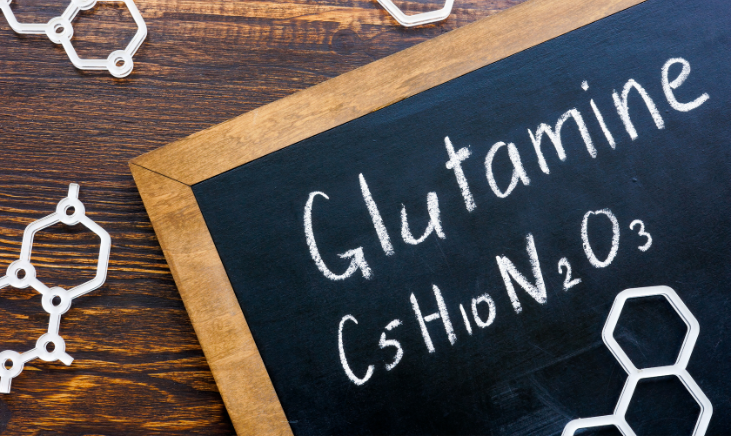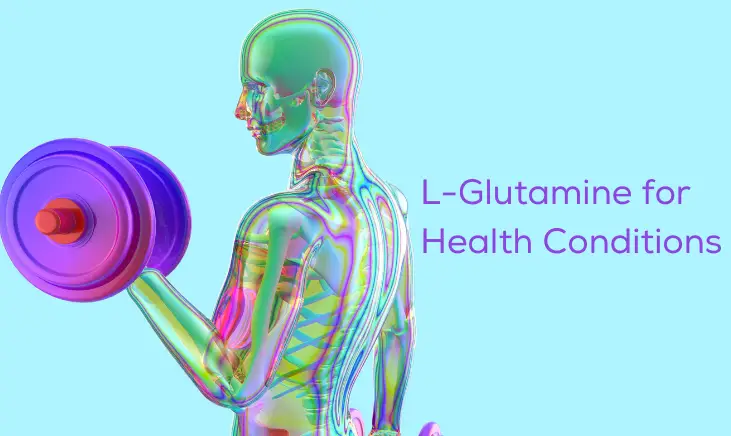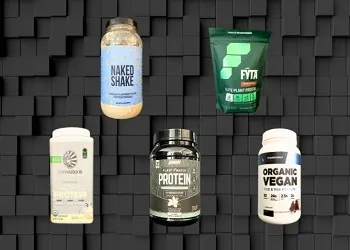L-glutamine is an essential amino acid naturally present in the human body. It has gained significant attention for its potential benefits in treating various health conditions, such as cancer, anxiety, and PCOS.
This article explores L-glutamine’s roles and benefits by examining current research and reviews.
Whether you are interested in supplementation or just curious about its effects on health, this article offers a comprehensive look into the multifaceted influence of L-glutamine on well-being.
It addresses controversies around its use and potential therapeutic applications.
Table of Contents
Understanding L-Glutamine

L-glutamine is an amino acid abundant in the human body. It plays a vital role in various biological functions and is a crucial building block for protein synthesis.
Additionally, it is essential for maintaining cellular energy, immune function, and gut health. Let’s look at what L-glutamine is and why it is necessary for our body.
Defining L-Glutamine
L-glutamine is an amino acid the body can usually produce in sufficient amounts. However, during stress or illness, the body’s demand for L-glutamine may exceed its ability to produce it. In such cases, L-glutamine becomes a conditionally essential amino acid that must be obtained from dietary sources.
L-glutamine is found in many foods, including meat, fish, eggs, dairy products, beans, and lentils. Getting enough of this amino acid from your diet can be crucial during increased demand.
Roles in the Body
- Protein Synthesis: It aids in building and repairing muscles, making it a popular supplement among athletes.
- Immune System Support: L-glutamine is fuel for immune cells, vital in maintaining a robust immune response.
- Gut Health: It helps maintain the barrier function of the intestines, protecting against leaky gut syndrome and supporting overall digestive health.
- Detoxification: L-glutamine is crucial in helping remove excess ammonia, a waste product of protein metabolism, from the body.
Curious about the other amino acids and how they work in different processes? Check out this article about all 20 of them.
L-Glutamine and Cancer

The relationship between L-glutamine and cancer is a topic of significant scientific interest and debate. Researchers have shown how cancer cells utilize L-glutamine, leading to important insights into the potential risks and therapeutic benefits.
The Debate: Does L-Glutamine Cause Cancer?
Some studies suggest that specific cancer cells rely heavily on L-glutamine for growth, leading to concerns about L-glutamine supplementation potentially fueling cancer proliferation. However, the evidence is inconclusive, and the relationship between L-glutamine and cancer growth is complex and varies depending on the type of cancer.
It’s important to differentiate between the effects of L-glutamine in the body and the impact of supplementation, especially at high doses.
L-Glutamine in Cancer Treatment
On the other hand, L-glutamine has been explored for its potential benefits in cancer treatment, particularly in reducing the side effects of chemotherapy and radiation therapy. It’s thought to aid in healing and cell repair, which can be crucial for patients undergoing these treatments.
Past research discusses the potential of L-glutamine in alleviating chemotherapy-induced mucositis, painful inflammation, and ulceration of the mucous membranes lining the digestive tract.
Ongoing research is critical to fully understand the implications of L-glutamine in the context of cancer. The current consensus is that L-glutamine’s effects vary greatly, and more targeted studies are needed to determine its safety and efficacy for cancer patients.
L-Glutamine and Anxiety

The potential role of L-glutamine in managing anxiety has become a topic of interest in both the scientific community and among those seeking natural remedies for mental health.
Does L-Glutamine Help With Anxiety?
L-glutamine’s role in neurotransmitter synthesis, particularly in producing glutamate and GABA (gamma-aminobutyric acid), suggests it may influence mood and anxiety levels. Glutamate is the primary excitatory neurotransmitter, while GABA has inhibitory effects, promoting relaxation.
Some evidence and preliminary studies suggest that L-glutamine supplementation might help alleviate anxiety by balancing these neurotransmitters. However, concrete scientific evidence supporting this claim is still limited.
Individuals considering L-glutamine for anxiety should approach it as a complementary therapy and not as a substitute for established medical treatments.
Glutamine vs. Other Anxiety Treatments
When compared to other natural supplements like SAM-e (S-adenosylmethionine), which has some evidence supporting its use in treating depressive and anxiety symptoms, L-glutamine’s effectiveness in anxiety management is less clear.
Fluticasone, primarily used as an anti-inflammatory medication, does not have a direct role in treating anxiety. Its mention in anxiety treatment contexts might be due to its use in addressing underlying conditions like asthma, which can exacerbate anxiety symptoms.
L-Glutamine and PCOS

Polycystic ovary syndrome (PCOS) is a common hormonal disorder among women of reproductive age, often leading to various metabolic issues. Due to its role in cellular metabolism and hormonal balance, L-glutamine has been explored for its potential benefits in managing PCOS symptoms.
L-Glutamine and Insulin
L-glutamine is known for its beneficial effects on insulin regulation and sensitivity, critical concerns in PCOS. Insulin resistance is a common feature in PCOS and can lead to further complications like type 2 diabetes and weight gain.
The amino acid also reduces inflammation and oxidative stress, contributing factors in the pathophysiology of PCOS.
Does L-Glutamine Help With PCOS?
While specific studies on L-glutamine’s direct effects on PCOS are limited, its known benefits in metabolic health suggest potential positive impacts for women with this condition.
Current research indicates that dietary and lifestyle interventions, including those that modify amino acid intake, can be effective in managing PCOS symptoms. As part of a balanced diet, L-glutamine might contribute to these beneficial effects.
Women with PCOS considering L-glutamine supplementation should do so as part of a comprehensive management plan, including diet, exercise, and possibly medication.
Consult healthcare professionals to understand the appropriate dosage and ensure supplementation aligns with individual health needs and treatment goals.
L-glutamine may also play a role in managing our cravings and weight. Learn more here.
L-Glutamine’s Potential in Other Health Conditions
Beyond its specific roles in cancer, anxiety, and PCOS, L-glutamine has been studied for its potential benefits in a variety of other health conditions. Its versatility as an amino acid makes it a topic of interest in diverse areas of health and wellness. Here, we explore some additional conditions where L-glutamine might offer benefits:
L-Glutamine in Digestive Health
- Intestinal Integrity: L-glutamine is pivotal in reinforcing the intestinal barrier, offering therapeutic potential in conditions like leaky gut syndrome. A recent study highlights its significance in maintaining gut barrier function, which can mitigate the pathogenesis of diseases such as IBS.
- Anti-inflammatory Effects: Its anti-inflammatory properties can soothe the digestive tract, reducing symptoms of gastrointestinal disorders. Research in Food Science and Human Wellness has shown that L-glutamine supplementation can decrease intestinal inflammation and improve gut function.
Boosting Immune Function
- Fuel for Immune Cells: L-glutamine is critical for immune cells, which may play a role in enhancing their function. A 2018 study underlines its role in supporting immune response, especially under stress or illness.
- Support During Illness: Supplementation can be beneficial in bolstering the immune system during periods of increased demand, such as recovery from surgery or infections.
Muscle Recovery and Athletic Performance
- Enhancing Muscle Repair: For athletes, L-glutamine facilitates muscle recovery and reduces soreness post-exercise. A 2023 review points to its beneficial effects on muscle recovery and growth.
- Supporting Athletic Performance: By aiding in protein synthesis and reducing recovery time, L-glutamine can indirectly enhance athletic performance, allowing for more consistent and intense training sessions.
Support in Wound Healing
- Cell Regeneration and Recovery: Its role in cell regeneration makes L-glutamine a valuable aid in wound healing, including post-surgical recovery. Research suggests that L-glutamine supplementation can accelerate wound healing and recovery.
- Anti-inflammatory Properties: By reducing inflammation, L-glutamine can further support the healing process, making it beneficial for chronic wound conditions and recovery from injuries.
Safe Use of L-Glutamine
While L-glutamine offers a range of potential health benefits, it’s important to approach its use safely and knowledgeably. Understanding the correct dosages, possible side effects, and the best ways to incorporate L-glutamine into your health regimen is vital in maximizing its benefits while minimizing risks.
Recommended Dosages
The dosage of L-glutamine can vary depending on the individual’s health status, age, and the specific condition being addressed. Generally, dosages used in studies range from 5 to 30 grams per day.
Following the dosage guidelines based on clinical research or as a healthcare professional recommends for specific health conditions is crucial.
While L-glutamine is generally considered safe, excessive intake can lead to side effects like abdominal discomfort, bloating, and diarrhea. Rarely, allergic reactions can occur.
It’s also important to know potential interactions with medications, particularly those affecting neurotransmitters or insulin sensitivity.
Incorporating L-Glutamine Through Diet
Besides supplements, L-glutamine can be obtained through dietary sources such as beef, chicken, fish, eggs, dairy products, and plant-based foods like beans and lentils. A balanced diet can help meet L-glutamine needs for many individuals.
Main Takeaways
In conclusion, L-glutamine, a versatile and crucial amino acid, holds significant potential in supporting various health conditions, ranging from cancer and anxiety to PCOS and beyond. While its benefits are promising, it is essential to navigate its use with a well-informed approach, considering individual health needs and consulting with healthcare professionals.
As we continue to uncover the expansive roles of L-glutamine, incorporating it safely and effectively into health regimens could be key to enhancing wellness. We encourage readers to discuss L-glutamine supplementation with their healthcare providers, ensuring a tailored and safe addition to their health and wellness strategies.
FAQs
Can L-glutamine supplementation help with cancer treatment side effects?
L-glutamine has shown promise in helping alleviate some side effects of cancer treatments, such as chemotherapy-induced mucositis. Some studies suggest that L-glutamine can aid in healing and cell repair, potentially reducing the severity of treatment side effects. However, it’s essential to consult with a healthcare provider to determine if L-glutamine supplementation is appropriate for your specific situation.
How does L-glutamine affect anxiety levels?
Research into L-glutamine’s impact on anxiety is still evolving, but it’s thought that the amino acid might help manage anxiety by influencing neurotransmitter synthesis, particularly glutamate and GABA, which play crucial roles in mood regulation. While some preliminary studies suggest potential benefits, more comprehensive research is needed to fully understand L-glutamine’s effectiveness in treating anxiety.
Is L-Glutamine beneficial for individuals with PCOS?
L-glutamine may offer benefits for those with PCOS due to its effects on insulin regulation and sensitivity, key concerns in PCOS management. Although direct studies on L-glutamine’s impact on PCOS are limited, its known roles in metabolic health suggest it could positively affect women with this condition.














